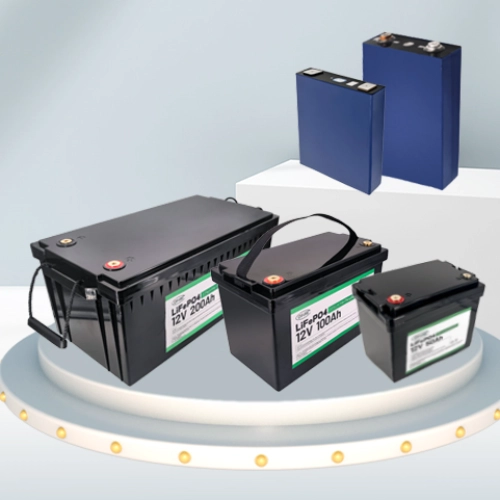LiFePO4 batteries have gained significant popularity in recent years when choosing a battery for your energy storage needs. With their superior performance and safety features, LiFePO4 batteries have become the go-to choice for many applications, including electric vehicles, renewable energy systems, and backup power solutions. In this comprehensive guide, we will explore the critical aspects of LiFePO4 batteries and provide valuable insights to help you decide when selecting the best LiFePO4 battery for your specific requirements.

Part 1. What is a LiFePO4 battery?
LiFePO4, short for Lithium Iron Phosphate, is a rechargeable battery that falls under the broader category of lithium-ion batteries. LiFePO4 batteries are known for their high energy density, long cycle life, and exceptional thermal stability. Unlike other lithium-ion chemistries, LiFePO4 batteries are inherently safer due to their stable chemical structure and low risk of thermal runaway.
Pros of LiFePO4 Batteries
- Safety: LiFePO4 batteries are considered one of the safest lithium-ion battery chemistries available. Their stable structure and low risk of thermal runaway make them less prone to accidents or fires.
- Long Cycle Life: LiFePO4 batteries can withstand many charge and discharge cycles compared to other lithium-ion batteries. They typically offer a 2,000 to 5,000 cycles or more lifespan, depending on the specific brand and usage conditions.
- High Energy Density: LiFePO4 batteries provide a high energy density, enabling them to store a significant amount of energy in a compact size. This makes them ideal for applications where space is limited.
- Wide Operating Temperature Range: LiFePO4 batteries perform well across various temperatures, making them suitable for hot and cold climates.
- Fast Charging: LiFePO4 batteries can rapidly charge, enabling quick turnaround times and minimizing downtime.
Cons of LiFePO4 Batteries
- Lower Energy Density Compared to Some Lithium-Ion Chemistries: While LiFePO4 batteries offer a respectable energy density, specific lithium-ion chemistries, such as lithium cobalt oxide (LiCoO2), have a higher energy density. This means LiFePO4 batteries may have a slightly lower capacity for the same physical size.
- Higher Initial Cost: LiFePO4 batteries generally have a higher upfront cost than other battery chemistries. However, their longer lifespan and superior performance often justify the initial investment over the long run.
Part 2. Factors to consider when buying LiFePO4 battery
When selecting the best LiFePO4 battery for your specific needs, you should consider several crucial factors:
- Capacity and Voltage
The capacity of a LiFePO4 battery refers to the amount of energy it can store, typically measured in ampere-hours (Ah) or watt-hours (Wh). It’s essential to assess your energy requirements and choose a battery with sufficient capacity to meet your needs. Additionally, consider the voltage requirements of your application, as LiFePO4 batteries usually have a nominal voltage of 3.2 to 3.3 volts per cell.
- Battery Management System (BMS)
A Battery Management System (BMS) is integral to LiFePO4 battery packs. It monitors and manages various aspects of battery operation, including cell balancing, temperature regulation, and protection against overcharging and over-discharging. When purchasing a LiFePO4 battery, ensure it has a reliable BMS to optimize its performance and enhance safety.
- Cycle Life and Warranty
Cycle life refers to the number of charge and discharge cycles a battery can endure before its capacity significantly degrades. LiFePO4 batteries have an impressive cycle life, but they can vary depending on the quality of the battery and the operating conditions. Consider the manufacturer’s specifications and warranty to ensure you select a battery with a satisfactory cycle life.
- Size and Weight
The physical dimensions and weight of the LiFePO4 battery are crucial considerations, mainly if you have limited space or weight restrictions in your application. Evaluate the size and weight of the battery to ensure it fits your available space and doesn’t hinder your system’s overall performance or portability.
- Brand Reputation and Support
When investing in a LiFePO4 battery, choosing a reputable brand known for producing high-quality and reliable products is essential. Research the brand’s reputation, customer reviews, and after-sales support to ensure you receive a superior battery and excellent customer service.
Part 3. Do you need BMS for LiFePO4 batteries?
A BMS ensures the battery’s optimal performance, safety, and longevity. Here’s why you need a BMS:
- Cell Balancing
LiFePO4 battery packs consist of multiple individual cells connected in series or parallel configurations. Over time, variations in cell performance can occur, leading to imbalances in charge levels. A BMS actively monitors and balances the charge across all cells, preventing the overcharging of some cells and the undercharging of others. Cell balancing enhances the overall performance and extends the lifespan of the battery pack.
- Overcharge and Over-Discharge Protection
Avoid overcharging or over-discharging LiFePO4 batteries, which can negatively impact their performance and safety. A BMS constantly monitors the battery voltage and ensures it stays within safe limits. If the voltage approaches dangerous levels, the BMS will intervene and either stop the charging process or cut off the power supply to prevent overcharging. Similarly, the BMS prevents the battery from discharging beyond safe levels, protecting it from damage.
- Temperature Regulation
Temperature is a critical factor that affects the performance and safety of LiFePO4 batteries. Extreme temperatures, whether too high or too low, can degrade the battery’s capacity and shorten its lifespan. A BMS monitors the battery pack’s temperature and activates cooling or heating mechanisms when necessary to maintain an optimal temperature range. This temperature regulation ensures the battery operates within safe limits and maximizes longevity.
- Fault Detection and Protection
A BMS has advanced monitoring capabilities to detect faults or abnormalities in the battery pack. It can identify short circuits, overcurrents, or voltage imbalances. When a fault is detected, the BMS takes immediate action, such as isolating the faulty cell or shutting down the entire battery pack, to prevent further damage or safety risks.
- State of Charge (SOC) Monitoring
Knowing the state of charge of a LiFePO4 battery is essential for accurately estimating its remaining capacity and planning your power usage. A BMS continuously measures the battery’s SOC and provides real-time data on its charge level. This information helps you optimize the battery’s utilization and avoid over-discharge or insufficient power.
Part 4. How do you calculate LiFePO4 battery capacity?
Calculating the capacity of a LiFePO4 battery is a straightforward process. We typically measure the capacity in ampere-hours (Ah). It represents the charge the battery can deliver over a specific period. Here’s how you can calculate the battery capacity:
- Determine the average current consumption of your application in amperes (A).
- Estimate the desired runtime in hours (hr) for which you want the battery to power your application.
- Multiply the average current consumption by the desired runtime to obtain the capacity in ampere-hours (Ah).
For example, if your application consumes an average current of 5A and you want the battery to power it for 10 hours, the calculated capacity would be:
- Capacity (Ah) = Average Current (A) x Runtime (hr)
- Capacity (Ah) = 5A x 10hr
- Capacity (Ah) = 50Ah
Remember that this calculation provides an estimate and does not account for factors like battery efficiency, voltage fluctuations, or the need for a safety margin. Choosing a battery with a slightly higher capacity than calculated is advisable to ensure optimal performance and longevity.
Part 5. LiFePO4 vs. lithium-ion batteries
LiFePO4 batteries and other lithium-ion batteries are both popular choices for various applications. However, there are some critical differences between the two chemistries:
- Safety
LiFePO4 batteries have a superior safety profile compared to other lithium-ion chemistries. Their stable chemical structure and low risk of thermal runaway make them less prone to accidents or fires. On the other hand, some lithium-ion chemistries, such as lithium cobalt oxide (LiCoO2), have a higher risk of thermal runaway and require additional safety measures.
- Cycle Life
LiFePO4 batteries offer a significantly longer cycle life compared to other lithium-ion batteries. With a typical lifespan of 2,000 to 5,000 cycles or more, LiFePO4 batteries can endure more charge and discharge cycles before their capacity significantly degrades. This makes them ideal for applications that require long-term reliability and durability.
- Energy Density
While LiFePO4 batteries provide a respectable energy density, specific lithium-ion chemistries offer higher energy densities. Chemistries like lithium cobalt oxide (LiCoO2) or lithium manganese oxide (LiMn2O4) have higher energy densities, allowing for more energy storage in a smaller physical size. However, it’s important to note that higher energy densities often come with increased safety risks.
- Cost
LiFePO4 batteries generally have a higher initial cost compared to other lithium-ion chemistries. However, their longer lifespan and superior performance often justify the initial investment over the long run. Lithium-ion chemistries may have a lower upfront cost. Still, they may require more frequent replacements, increasing overall costs.
- Environmental Impact
LiFePO4 batteries are considered more environmentally friendly compared to other lithium-ion chemistries. They contain non-toxic materials and have a minimal risk of hazardous chemical reactions. LiFePO4 batteries can be recycled and reused, reducing their environmental impact.
Part 6. FAQs
-
Should I charge my LFP battery to 100% every day?
Yes. Experts recommend regularly charging LiFePO4 batteries to 100% capacity. LiFePO4 batteries are unaffected by the “memory effect” that older battery technologies suffer from. Therefore, periodically charging them to total capacity helps maintain their overall performance and ensures optimal battery health. -
Can I use LiFePO4 without BMS?
While it is technically possible to use LiFePO4 batteries without a Battery Management System (BMS), experts strongly advise against doing so. A BMS is critical in monitoring and protecting the battery from various factors, such as overcharging, over-discharging, and excessive temperatures. -
What is the maximum charge current for LiFePO4?
LiFePO4 batteries typically have a recommended maximum charge current of around 1C. The “C” represents the battery’s capacity, so if you have a LiFePO4 battery with a capacity of 100Ah, the maximum charge current would be around 100A. -
How can you tell if a LiFePO4 battery is bad?
Signs of a potentially harmful LiFePO4 battery include reduced capacity, increased internal resistance, irregular voltage readings, and physical damage. If you notice any of these signs, it is advisable to stop using the battery and seek professional evaluation.
Related Tags:
More Articles

Overview of Deep Cycle Lithium Battery
In this article, we explore the life, voltage, capacity, and charging considerations of deep cycle lithium batteries.
How Long do Lithium Batteries Last?
How long do lithium batteries last? we will explore the factors that influence the lifespan of lithium batteries and provide insights into their longevity.
Get 12v Lithium Car Battery As a Power Source for the Ride
Make the right choice for your vehicle's battery needs by installing a 12 volt lithium car battery. You will enjoy maintenance-free longevity with this change.
Everything About A Small Lithium Ion Battery
Discover the features, uses & future potential of a small lithium ion battery. A compact and tiny powerhouse ideal for smartphones, wearables, drones & more.
Why Should You Choose Lithium Ion Marine Battery?
Upgrade your boat's power with a Lithium ion marine battery, featuring lighter, longer life, faster-charging abilities. Let's choose the best marine battery.





